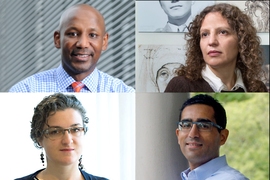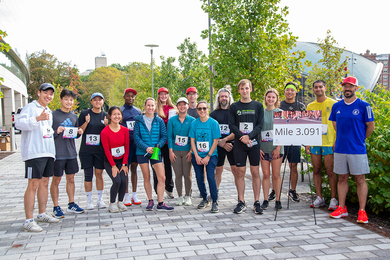Artist Ekene Ijeoma will join the MIT Media Lab, founding and directing the Poetic Justice research group, in January 2019. Ijeoma, who will be an assistant professor, works at the intersections of design, architecture, music, performance, and technology, creating multisensory artworks from personal experiences, social issues, and data studies.
Ijeoma's work explores topics and issues ranging from refugee migration to mass incarceration. At its most basic level, the work aspires to embody human conditions, expand people's thoughts, and engage them in imagining change and acting on it. At the lab, Ijeoma will continue this work in developing new forms of justice through artistic representation and intervention.
“New forms of justice can emerge through art that engages with social, cultural and political issues — ones that aren’t tied to codified laws and biased systems,” he says.
When asked to define “poetic justice,” Ijeoma explained that, for him, the phrase is about using code-switching content, form, context, and function to create artwork with rhythm and harmony that extends our perceptions and exposes the social-political systems affecting us as individuals. An example of this is his “Deconstructed Anthems” project, an ongoing series of music performances and light installations that explores the inequalities of the American Dream and realities of mass incarceration through “The Star-Spangled Banner,” and “Pan-African AIDS,” a sculpture examining the hypervisibility of the HIV/AIDS epidemic in Africa and the hidden one in Black America. “Pan-African AIDS,” is on display through April 2019 at the Museum of the City of New York as part of the exhibit Germ City: Microbes and the Metropolis.
Ijeoma’s art practice has been primarily project-based and commission-driven. His recent large works, both deeply conceptual yet highly technical projects, required research and development to happen concurrently with the production of the work. At the Media Lab, with more space for trial and error and failure, he will have the resources and facilities to stay reflective and proactive, to create work outside of commissions, and to expand more artworks into series. In addition, he will have opportunities for more listening to and meditating on issues.
“Like many artists,” said Ijeoma, “A lot of my work comes from vibing and forward thinking — channeling my environment and signaling out the noise.” This aspect of his practice is reflected in work such as “The Refugee Project ” (2014), released a few months before the European refugee crisis, and “Look Up” (2016), released a few days before Pokemon Go; and more recently “Pan-African AIDS” which was presented as news was breaking on the underreported AIDS epidemic in the black populations in areas including the American South.
Ijeoma’s work has been commissioned and presented by venues and events including the Museum of Modern Art, The Kennedy Center, the Design Museum, the Istanbul Design Biennial, Fondation EDF, the Annenberg Space for Photography, the Neuberger Museum of Art at the State University of New York at Purchase, and Storefront for Art and Architecture.
“We are thrilled that Ekene Ijeoma will be joining the Media Lab and MAS program,” said Tod Machover, head of the Program in Media Arts and Sciences, the Media Lab’s academic program. “Ekene’s work is brilliant, bold, and beautiful, and the way he combines expression, reflection, innovation, and activism will place him at the absolute center of Media Lab culture, hopefully for many years to come.”
Ekene Ijeoma graduated with a BS in information technology from Rochester Institute of Technology, and an MA in interaction design from Domus Academy. He has lectured and critiqued at Yale University, Harvard Law School, Columbia University, New York University, the School of Visual Arts, and The New School.









